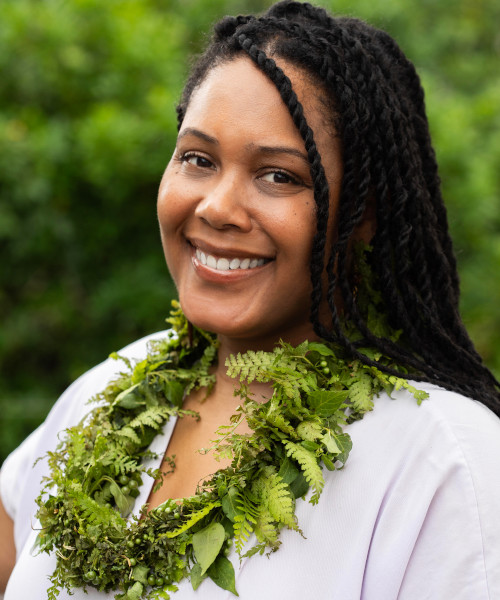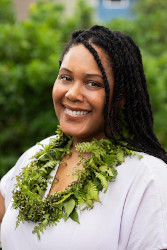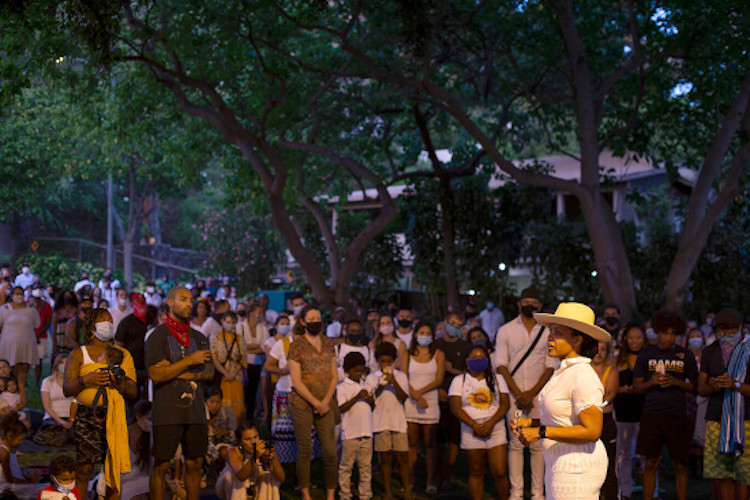
Akiemi Glenn (PhD 2012), Founder and Executive Director of The Pōpolo Project

Dr. Akiemi Glenn earned her PhD in the UHM Department of Linguistics in 2012, and has since become a leader in the nonprofit world in Honolulu. She is the Founder and Executive Director of The Pōpolo Project, an organization that works to redefine what it means to be Black in Hawaiʻi. She has spent years working on issues of identity, especially those surrounding language use.
Akiemi credits her life-long interest in language and identity with growing up in Virginia in a community where evidence (especially linguistic) of Indigenous presence surrounded her. Her mother is Coharie, and Akiemi understood at an early age that the intersection of language, community, and identity can be complex. “I knew that there was a complicated story of how and why we became English speakers, and how the community organized itself.” Akiemi became interested in linguistics as a teenager, when a class on etymology at Johns Hopkins university exposed her to Algonquian languages. She later attended New York University, where she majored in linguistics.
After moving to Hawaiʻi, Akiemi became interested in attending graduate school to look more deeply at the relationship between marginalized communities and their languages. The graduate program in Linguistics at UHM appealed to her because of its focus on language documentation. “One of the things that continued to pique my interest was this connection between Indigenous languages and what history can tell us about our contemporary moment. I find language really compelling in that way. Many of the communities that I grew up around were very marginalized, but their languages were prominent in ways that were still imprinted on the land and on the maps.”
While Akiemi was a graduate student, she began to work with the local Tokelauan community in Honolulu, who have been working to preserve their language despite living far from Tokelau. “I was really interested in the ways that this particular endangered language, spoken mostly in the diaspora, was being used as a way for Tokelauans living very far from their home to negotiate their identities here in Hawaiʻi.” Her dissertation is an ethno-metalinguistic description of language reclamation work taking place at Te Lumanaki o Tokelau i Amelika, a Tokelau language school that is still operating in Mililani on Oʻahu.
After graduation, Akiemi was hired by McREL International to conduct educational research throughout the Pacific region before turning to consultancy work. “For several years I worked as a freelance consultant with a number of philanthropic entities here in Honolulu, across the Pacific, in New Zealand and in North America, evaluating the efficacy of culture-based programs. My background in qualitative approaches to linguistics was really useful in building skills for this kind of work.”

At the same time, Akiemi was simultaneously building The Pōpolo Project, the organization to which she currently dedicates most of her time. “It’s a small, community-based organization that creates space and visibility for Black people living here in Hawaiʻi.” Some of this visibility work involves creating new media around Black experiences in the islands. “We are currently working on a full-length documentary about the life of Kamakakehau Fernandez, a Black man who was adopted when he was six weeks old by a Hawaiian family that was very active in the Hawaiian language revitalization movement. They raised him to speak Hawaiian, and he got really connected to Hawaiian music. He plays ukulele and sings leo kiʻekiʻe, and he’s not what people often think a Hawaiian singer would look like.”
The Pōpolo Project regularly hosts activities to bring the Black community in Hawaiʻi together, which Akiemi says is “small and not always very visible. People donʻt really know much about the Black presence in Hawaiʻi, and, by extension, the conversations that have been happening across the African diaspora.” For example, in 2020 they hosted Quito Swan, author of Pasifika Black, a book that chronicles anti-colonial movements of the Pacific region. Akiemi and The Pōpolo Project also create space for interaction and education, like celebrating holidays together and running youth programs. “There’s a whole variety of things we do. I still talk about the Pōpolo Project as a kind of experimental still, even though we’ve been around since 2017.”
Akiemi has a little advice for students who are thinking about pursuing a Linguistics degree at UHM. “My biggest piece of advice is to follow whatever it is that piques your interest, even if it seems really niche. You never know where following an interest that catches your imagination will take you. My own experience has been a really circuitous route to where I am now, but every single move that’s happened was because I was open, curious, and interested in people and language.”
